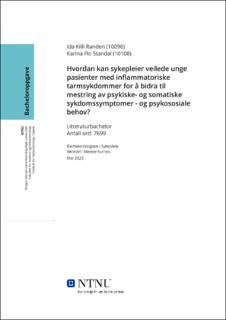| dc.contributor.advisor | Furnes, Merete | |
| dc.contributor.author | Randen, Ida Killi | |
| dc.contributor.author | Standal, Karina Flo | |
| dc.date.accessioned | 2023-07-24T17:19:25Z | |
| dc.date.available | 2023-07-24T17:19:25Z | |
| dc.date.issued | 2023 | |
| dc.identifier | no.ntnu:inspera:139585348:151284150 | |
| dc.identifier.uri | https://hdl.handle.net/11250/3081151 | |
| dc.description.abstract | Bakgrunn:
Inflammatoriske tarmsykdommer er vanlige diagnoser, men er likevel assosiert med stigmatisering. Pasientgruppen preges av varierende sykdomsaktivitet og faktorer som påvirker psykososiale behov. Unge mennesker med diagnosene bekymrer seg om påvirkninga sykdommen kan ha på skolegang, studier eller sosiale situasjoner.
Hensikt:
Å benytte teori og forskning til å belyse hvordan sykepleiere kan veilede unge mennesker med inflammatoriske tarmsykdommer, for å bidra til mestring av psykiske-, somatiske- og psykososiale utfordringer.
Metode:
Litteraturstudien benytter åtte forskningsartikler av både kvantitative og kvalitative metoder. Brukte databaser er Cinahl Complete og PubMed.
Resultat:
Tematisk analyse avdekket fire tema: “Samspill mellom stress, stigma og gastroenteriske symptomer”, “Pasientens behov for informasjon og støtte", “Mestring og aksept” og “Fysisk aktivitet og livskvalitet”.
Konklusjon:
Det kreves helhetlig tilnærming i sykepleie til unge pasienter med inflammatoriske tarmsykdommer. Man bør kombinere sosiale og emosjonelle mestringsstrategier ut fra individuell tilnærming gjennom veiledning. Pasientens aksept og ansvar i samsvar med helsepersonell, er også viktig. Sykepleiere kan undervise, veilede, informere og tilrettelegge for ressurser som dekker psykososiale behov. Et helsepolitisk syn bør inkluderes når det er snakk om ivaretakelse av psykososial helse, da helsefremmende arbeid er utfordrende i praksis, og sykepleiere ikke alltid strekker til for ivaretakelse av pasientens behov utenfor helsetjenesten. | |
| dc.description.abstract | Background:
Inflammatory bowel diseases are common, but still associated with stigma. The patients suffer from varying disease activity and factors that affect psychosocial health. Young patients often worry about the diagnosis’s effect on schooling or social situations.
Purpose:
To use theory and research to highlight how nurses can counsel youth with the diagnosis, and contribute in coping with challenges within
psychological, somatic and psychosocial health.
Method:
A literature study that uses eight research articles of quantitative and qualitative methods. The used databases are Cinahl Complete and PubMed.
Result:
The analysis resulted in four themes: “Interaction between stress, stigma and gastroenteric symptoms”, “The patients need for information and support”, “Coping and acceptance” and “Physical
activity and quality of life”.
Conclusion:
Nursing to young adults with these diagnoses demands a holistic approach. Combined social- and emotional coping strategies based on individual adaptation through counseling, patient acceptance and personal responsibility along with health personnel is important. Nurses can teach, counsel, inform and facilitate resources to help meet psychosocial needs. However, a health-political point of view should be included when discussing psychosocial health, because nurses may not fully cover the patients’ psychosocial needs outside of the health service. | |
| dc.language | nob | |
| dc.publisher | NTNU | |
| dc.title | Hvordan kan sykepleier veilede unge pasienter med inflammatoriske tarmsykdommer for å bidra til mestring av psykiske- og somatiske sykdomssymptomer - og psykososiale behov? | |
| dc.type | Bachelor thesis | |
